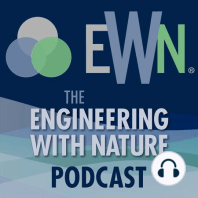27 min listen

EWN Practice Leads Sharing Expertise through the EWN Cadre
EWN Practice Leads Sharing Expertise through the EWN Cadre
ratings:
Length:
34 minutes
Released:
May 31, 2022
Format:
Podcast episode
Description
In Episode 2 we had a high energy roundtable with the EWN Practice Leads who play a critical role in broadening and expanding the application of Engineering With Nature practices and nature-based solutions within the US Army Corps of Engineers. In Episode 3, the EWN Practice Leads return to talk about how they’re solving challenges, advancing EWN implementation through the EWN Implementation Cadre, and sharing what they are learning with other practitioners. Host Sarah Thorne and Jeff King, Deputy Lead of the Engineering With Nature Program at the US Army Corps of Engineers (USACE), are joined again by a roundtable of the EWN Practice Leads. Elizabeth Godsey is the Technical Lead for Coastal Engineering and Regional Sediment Management with Mobile District; Danielle Szimanski is a Project Manager and Ecologist with Baltimore District; Eddie Brauer is a Senior Hydraulic Engineer with St. Louis District; and Dave Crane is an Environmental Resource Specialist with Omaha District. We asked each to talk about their current projects. Danielle, a Coastal Practice Lead, describes her work in the Chesapeake Bay where rising sea level is already occurring and is expected to increase. She and her team are restoring barrier islands and marshes to combat the loss of habitat and for flood risk management of inland areas. “Being able to restore these marshes, especially if they're degraded and fragmented, and being able to stave off that future loss and stop them from turning into open water is critical for the Chesapeake Bay.” Danielle also discusses work underway at Deal Island: “The Deal Island project is a maintenance dredging project on the Wicomico River. We're going to use the dredge material to restore approximately 70 acres of degraded and fragmented marsh. This will restore that wetland for migratory birds, and provide nesting habitat specifically for the Saltmarsh Sparrow, which is a threatened species.” She adds, “there's been a lot of work with other federal, state and non-government agencies to create this design and complete pre- and post-monitoring to assess how these wetlands are actually going to provide habitat once they are created.” Elizabeth, also a Coastal Practice Lead, has worked on a number of coastal restoration projects in the Gulf to restore habitats for threatened and endangered species including sea turtles and piping plovers: “In Mississippi alone we've restored over 2,500 acres across the coastal zone habitats, including beach, dune, wetlands, and island restoration. That's about 2000 football fields of restoration work in that state alone.” She’s taking that first-hand knowledge and experience and, as a Practice Lead, sharing leading practices and key learnings with others: “The biggest thing that we're doing is our monitoring and adaptive management. It's a long-term look at the project performance and the ecological benefits that come from the projects. We give that back to scientists, to universities, to people at the Engineer Research and Development Center (ERDC), and the US Geological Survey (USGS) so they can improve their modeling tools and reduce uncertainty in their predictions.” She also stresses the importance of combining multiple benefits to help achieve whatever the mission goal is, whether it is storm risk management, navigation and economic benefit, or ecosystem protection and restoration: “We're able to integrate each of those benefits and provide that value-add to the nation. We’re getting that message out and showing people how to do that, and how you communicate the benefits of this approach to decision-makers.” Turning to the Riverine Practice Leads, Eddie describes the importance of taking a holistic perspective of riverine systems. “There are so many people that have a day-to-day connection to the river beyond just the projects that the Corps is doing. It's our responsibility to ensure that we account for everyone's needs on all the projects that we construct. To do that, it'
Released:
May 31, 2022
Format:
Podcast episode
Titles in the series (82)
EWN’s Synergies with the World Bank’s Approach to Natural Infrastructure: Part 1 of 2 by EWN - Engineering With Nature